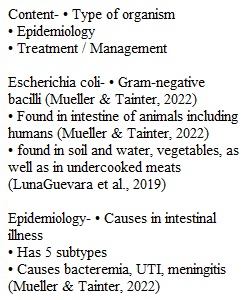


Q BIOL180 Mini-Presentation Assignment Objective: For this assignment, you will introduce your Course Project topic by uploading a brief mini-presentation. Before You Start: To prepare for this assignment, I recommend that you: • Read these directions carefully. • Read the BIOL180 Mini-Presentation Grading Criteria.pdf. The grading criteria is a detailed evaluation that I will use to assess your performance. It also will help you understand what is expected of you as you prepare your assignment. • Use your own words (paraphrase). For help with paraphrasing, please review the 'Quoting and Paraphrasing' help in the Trefry Library Writing@APUS Center. • Note that your Turnitin report similarity score should be under 20% (not including references) and free of paraphrasing issues. Review the color-flagged text on your report, fix any issues, and resubmit again before the deadline (this assignment is set to unlimited submissions until the deadline). • Note that less than 10% of your work should contain direct quotes. • Email me with any questions! Assignment Instructions: The topic of your Course Project will be any one species of organism (e.g., a microorganism, plant, fungus, animal, etc.). Choose only one that interests you, as this will be the topic used for all Course Project steps and assessments throughout the term. Keep the following in mind: The topic of the course project will be any species native to your area or one that interests you. The organism should come from one of the four major kingdoms (Protist, Fungus, Plant, or Animal) and be indigenous to the area in which you reside. The organism should not be a domesticated pet, farm animal, houseplant, human, etc., but rather a wild species native to the local area where you live or one that you find interesting but may not be able to directly observe (e.g., great white shark). You will be researching details of your organism in the wild, not as a plant cultivar or as an animal may live as a pet or captive zoo inhabitant, as these conditions are not wild. If possible, try to select a different species than your classmates. However, it is okay if more than one classmate selects the same organism; I want you to be interested and excited about what you will be researching! Mini-Presentation requirements: Your presentation will be submitted as an audio-narrated PowerPoint, narrated by you, the student. You cannot use "text-to-speech" programs or technologies that do the narration for you unless noted as an approved accommodation in a current DSA letter you have furnished to me. For instructions on how to create audio narration in PowerPoint, see the following link: Record a Slide Show With Narration. Audio narration is a requirement! • Familiarize yourself with the BIOL180 Course Project Guide.pdf. • Create a 3-4-slide audio-narrated PowerPoint presentation to include the following: o A title slide with your name, date, class name, instructor name, and project topic o Content slide(s) to include: ? The common and scientific name of your organism. Please see this link to help with scientific names if needed: How To Write Scientific Names of Organisms ? Where you observed your organism (country, state, park, zoo, etc.) ? A brief discussion on why you chose your organism ? If possible, a picture and/or video of you safely observing your species in the field. If not possible, search the Internet for an image (and remember to cite your source for the image) in a typical habitat. o Reference slide for all source material and images used within the mini-presentation ? [Recall that Wikipedia is not considered a credible source for our purposes and should not be used in class.] *Writing Expectations: Apply scientific concepts and use scientific terminology correctly. Utilize proper spelling, grammar, and punctuation. For help with pronunciation, see this link: Collins Online Dictionary. Additional Resources: • APA – In-Text Citations: The Basics • APA – Reference List: Basic Rules • Additional guidance for how to format clip art and stock images: https://apastyle.apa.org/style-grammar-guidelines/references/examples/clip-art-references Evaluation: Review the BIOL180 Mini-Presentation Grading Criteria that describe how your mini-presentation will be graded. Submission Instructions: 1. You must submit your Mini-Presentation as a "PowerPoint" (.ppt or .pptx) file AND title your file name as FirstnameLastname_BIOL180_Mini_Presentation.pptx. Otherwise, you will not receive credit for your assignment. 2. Upload your assignment for grading by selecting the "Add a File" section. 3. The new screen will prompt you to select the "My Computer" button so you can locate the MS PowerPoint file of your Mini-Presentation on your computer. 4. Find the file and double-select on it. 5. Select "Continue". 6. Double-check to ensure that your Mini-Presentation was successfully uploaded as an attachment. 7. When you have completed this assignment, type "Completed" in the rich text editor box below. 8. Select the "Submit" button. 9. Your Mini-Presentation is automatically submitted to Turnitin with your submission: Mini-presentations will be automatically added to and checked against the standard Turnitin repositories. Originality reports will be returned to the faculty and student in roughly 15 minutes of the submission. Multiple submissions are allowed before the due date. If you wish to learn more about and how to access Turnitin.com, a plagiarism detection website, these are available from the Trefry Online Library. APUS Writing Center NOTE: For those having trouble uploading the PPT file directly to the classroom, as instructed above, your file may be too large with audio narration or multiple images/video. Therefore, save your presentation to OneDrive in Office 365, paste the link in the Comment box, and upload a non-audio version of your presentation file which will scan through Turnitin. Select HERE for instructions on uploading files and sharing links on One Drive. Due DateJan 15, 2023 11:59 PMAttachments BIOL180 Course Project Guide.pdf (71.52 KB) BIOL180 Mini-Presentation Grading Criteria.pdf Download All Files
View Related Questions